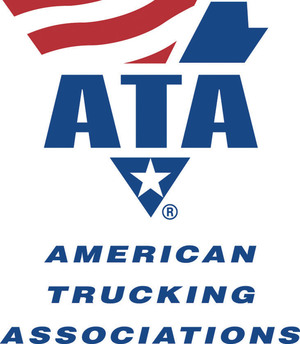Clean Trucks Program Reduces Truck Pollution Under Current Transportation Law, ATA Tells Congress
WASHINGTON, May 5 /PRNewswire-USNewswire/ -- The debate over the Port of Los Angeles' effort to ban drayage truck owner-operators is not about clean air or reducing the environmental footprint at the Ports of Los Angeles and Long Beach, Robert Digges, Jr. Vice President and Chief Counsel of the American Trucking Associations (ATA) today told a subcommittee of the House Transportation & Infrastructure Committee.
(Logo: http://www.newscom.com/cgi-bin/prnh/20100129/ATALOGO)
"ATA initiated litigation … against the Ports of Los Angeles and Long Beach challenging their use of mandatory Concession Agreements to implement their respective Clean Truck Programs. Our aim then and now is not to block or hinder implementation of the truck retirement-clean air portions of these programs. What we are opposing is the banning of the independent contractor business model at the port as well as the mandated use of a concession contract by which the port grants to itself discretion to decide which otherwise federally qualified motor carriers can participate in port transportation services," said Digges.
The Clean Trucks Programs at the Ports of Los Angeles and Long Beach has accomplished impressive results without concession requirements, reducing truck pollution by 80 percent almost 3 years ahead of schedule. "Moreover, over 6,500 clean trucks now serve the ports and most of the new fleets were financed with private – not public or port – funding. In fact the trucking industry has actually spent approximately $600 million of its own money to finance new clean truck purchases, more than 10 times more than the Port of Los Angeles has to date redistributed to the program from its container fee collections. Even though the 'retired trucks' are permitted to operate everywhere else in the country, the trucking industry has supported their early retirement at the ports -- underscoring our commitment to improving air quality in the maritime transportation-container trades sector," said Digges.
It is also important to note that the Port of Long Beach never included a ban on owner-operators and reached a settlement with the trucking industry in October of 2009. "The Settlement was based upon a new motor carrier registration process which replaced the Port of Long Beach's Concession Agreement which is the focus of the ATA legal challenge. As a result of the Settlement, Los Angeles is now the sole defendant in this case," said Digges.
"All motor carriers now wishing to perform drayage services at [Long Beach] must, via the new Registration and Agreement Form, register with the Port and agree to provide certain operational information to assist the Port in monitoring motor carrier compliance with various safety, environmental, and security regulations pertaining to providing drayage services at the Port," said Digges. "Long Beach is implementing a Clean Truck Program identical to that of Los Angeles without disrupting the entire drayage market, while at the same time establishing tough enforcement of existing laws (including on-port inspections) that will protect the port's environmental, safety, and security interests."
In the lawsuit, ATA asserts that the Port of Los Angeles Concession Plan is preempted by federal statute. Specifically, under F4A - 49 U.S.C. Section 14501(c)(1), "a political subdivision of a state 'may not enact or enforce a law, regulation, or other provision having the force and effect of law related to a price, route, or service of any motor carrier.' The LA Concession Plan on its face controls access to the port drayage market and many of its provisions will have a major impact on motor carrier rates and services," said Digges.
"The port's entire justification for the independent contractor ban is based on the false premise that motor carriers lack accountability for the safe operation of owner-operator drivers and their trucks," Digges concluded. "The port refuses to acknowledge that under the federal safety regulatory scheme – which the port police can fully enforce – motor carriers have identical accountability and safety responsibility for owner-operators and their trucks as they do for employee drivers and company owned trucks. If the port is legitimately worried about truck safety all they have to do is enforce the existing law and because they have a perfect enforcement environment, with controlled gate access for each truck and driver."
Read ATA's April 23 press release Teamsters Mislead Press on Effects of Port of Los Angeles Lawsuit at:
http://www.truckline.com/pages/article.aspx?id=702%2F{8E1C7279-ED27-4C03-B189-CEEEE26BBB12}
Digges' testimony to the House Transportation & Infrastructure subcommittee can be found at http://www.truckline.com/Newsroom/Pages/testimony.aspx
The American Trucking Associations (www.truckline.com) is the largest national trade association for the trucking industry. Through a federation of other trucking groups, industry-related conferences, and its 50 affiliated state trucking associations, ATA represents more than 37,000 members covering every type of motor carrier in the United States. Follow ATA on Twitter @TruckingMatters (www.twitter.com/truckingmatters), or become a fan on Facebook (http://tinyurl.com/y4qwp6h).
SOURCE American Trucking Associations
WANT YOUR COMPANY'S NEWS FEATURED ON PRNEWSWIRE.COM?
Newsrooms &
Influencers
Digital Media
Outlets
Journalists
Opted In





Share this article